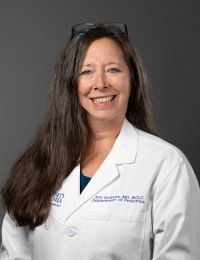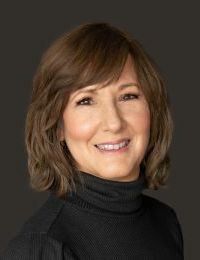
This presentation focuses on issues regarding low milk production among lactating individuals who exclusively pump. The session will cover reasons for insufficient breast development during pregnancy, medical complications that can impact secretory activation, and common reasons why people may have a loss of milk production. Interventions to improve milk production will be discussed.
IBLCE Content Outline: 1 L Cerp (I, II, III, IV, V, VI VII)
In this presentation, Dr Kellams will review how to support families with exclusive breastfeeding, how to determine if supplementation is needed, how to prevent the need for supplementation, and how to get back to breastfeeding if supplementation occurs.
Following the presentation, participants will be able to:
IBLCE Content Outline: 1 L Cerp (I, III, IV, V, VI, VII)
In this presentation, participants will learn about the causes of feeding aversion in breastfeeding babies and signs, even ones that may be quite subtle, that are indicative of aversion at the breast. They will be instructed on ways to support mothers in maintaining a breastfeeding relationship through the use of responsive feeding measures. Responsive feeding is a reciprocal process between a parent and an infant where infants communicate their hunger and fullness cues, and parents respond to those cues. With responsive feeding measures, caregivers are taught ways to manage feeding aversion, without force or pressure and through the use of consistent and predictable responses which help teach the baby self-regulation with eating. Participants will be able to support families in identifying and even preventing more intense aversive feeding behaviours that could sabotage the breastfeeding relationship. While aversion to the breast can be stressful to the family, it can be managed with the right responsive feeding techniques. Participants will also be educated on ways to collaborate with other health care professionals, such as a dietitian if the feeding situation is more complex and parents may be experiencing fear due to poor weight gain.
IBLCE Content Outline: 1.5 L CERP (I, III, V, VI, VII)
Antenatal breastmilk expression (ABME) has been shown to be effective in reducing the use of infant formula supplementation and significantly improves postnatal lactation performance by causing early establishment of adequate milk supply. What are the dos and don’ts of this technique?
Following the presentation, participants will be able to:
IBLCE Content Outline: 1 L Cerp (I, II, III, VI, VII)
In this presentation, Ginna will discuss the use of alternative feeding methods, nipple shields, weighing babies, and pumping. When do they help? When do they hinder? As we acquire more devices and new technology, how do we discern which ones help and which cause problems of their own?
IBLCE Detailed Content Outline: 1 L Cerp (III, VI, VII)

Ginna Wall
Ginna ran the lactation program at the University of Washington Medical Center in Seattle Washington for 35 years. She led the way to Baby-Friendly Hospital certification in 2009 and recertification in 2019. Before that she was an acute care inpatient pediatric nurse, a camp nurse, a childbirth educator, and a doula. She enjoys teaching healthcare workers about all the things she learned along the way.

Anne Eglash
Dr Eglash is a clinical professor with the University of Wisconsin School of Medicine and Public Health, in the Dept of Family and Community Medicine. She has been practicing breastfeeding and lactation medicine since 1994. She is a cofounder of the Academy of Breastfeeding Medicine, the medical director and cofounder of the Mothers’ Milk Bank of the Western Great Lakes, and the medical director of the University of Wisconsin Breastfeeding and Lactation Medicine Clinic.

Grace Tay Yue Wen
Dr Grace is a practising lactation consultant at Gloria Lactation Centre, and founder of Gloria Confinement Centre, a postnatal care centre located in Penang, Malaysia. She graduated with Honours from University College Dublin in 2012 and received the Malaysian Medical Association Book Prize for Obstetrics & Gynaecology, and for Surgery. Dr Grace is currently engaged in research with the RCSI-UCD Malaysian Campus for the “Evaluation of an Antenatal Lactation Preparation Package (ALPP) on Breastfeeding Practices Among Postnatal Mothers in a Postnatal Care Centre in Penang”, and “BF City— determining the indicators of a breastfeeding-friendly city”. She is also an active member of the Making Penang Breastfeeding-Friendly (MBPF) State Government Initiative since 2019.

Ann Kellams
Dr Ann Kellams is board-certified in both pediatrics and breastfeeding and lactation medicine, and is an IBCLC and a professor of pediatrics. In 2006, Dr Kellams joined the UVA Department of Pediatrics faculty and became the medical director of the newborn service on the maternity unit. She is the founder and director of UVA’s Breastfeeding and Lactation Medicine program. In 2018, Dr Kellams became the vice chair for Clinical Affairs for UVA’s Dept of Pediatrics. In 2022, she was inducted into the American Pediatric Society, and in 2023 she was in the first class of physicians to become certified by the North American Board of Breastfeeding and Lactation Medicine. She is the immediate past president of the Academy of Breastfeeding Medicine.

Jill Rabin
Jill Rabin is a pediatric speech pathologist and IBCLC with a private practice in Chicago. She has been working with the 0-3-yr-old population since 1986. Her areas of specialty include facilitating breastfeeding in at-risk populations such as preterm infants, babies with tethered oral tissues and babies with Down syndrome, managing feeding aversion and using the Adapted Baby-Led Weaning Approach® to transition babies with feeding challenges to solids. She co-authored the book Your Baby Can Self-Feed, Too! with Gill Rapley in 2022. Jill lectures nationally and internationally as well as teaching live virtual classes for transitioning to solids to parents of babies. Jill co-moderates an international Zoom group for expectant, pumping and breastfeeding parents of babies with Down syndrome through Julia’s Way and the Massachusetts Down Syndrome Congress.